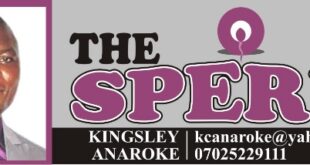All have sinned and come short of leadership glory! I had the privilege of having a hearty discussion with a highly revered personality in the maritime industry recently, during which he expressed profound consternation that the Nigeria’s indigenous ship owners could not raise capital to finance their 40 per cent share capital in the proposed national fleet by the Federal Government in which the a Singaporean shipping firm, PIL has taken 40 percent participation as a technical partner. He was short of saying, “All of them can’t raise that equity that makes the investment Nigerian, why then are they called ship owners?” I was not however convinced he had his submission right. Feeling that there was something amiss, I got myself, even emotionally irritated. “How can, is it this hopeless,?” I retorted in a muted voice. It was a hard buy to me.
A couple of weeks after, I had an engaging interview with Engr. Greg Ogbeifun, President, Ship Owners Association of Nigeria(SOAN). I could not have forgotten to ask that question and he could not have evaded it. He said the economic reality of the day is the reason but added that he in particular had assets without cash. Of course, equity financing of such is usually a business consummated with assets backed by financial institution’s supports. Why is the asset not working for this purpose? The proposed national fleet, as it stands now is at a crossroad, not minding the promise of the Afri-Exim bank to bail Nigerian ship owners out. However, the bank cannot come in in a vacuum.
The Minister of Transport, Rotimi Amaechi wanted this project as a flag-ship project of this administration in the maritime transport sector. But the more moves he makes to realize this dream, the more elusive it seems. The last straw was the reality of the incapacitation of the shipowners to subscribe to the national fleet of their dream. Where then are the shipowners?
Many of the ship owners have turned consultants, portfolio ship owners, with huge indebtedness to banks. A report attributed to some of them said they are owing banks non-performing loans to the tune of N5 billion which accrued from ship purchases and financing. Many of them are giving away their properties in choice areas in different cities to survive. Surprisingly, they have at various times lately attributed these developments to the “Change”-induced economic hardship as Ogbeifun had re-echoed. The newest dimension to the pains is the excurses given, which include: Instability in global oil market, unavailability of forex, non- implementation of Cabotage Act and non- disbursement of Cabotage Vessel Finance Funds(CVFF).

A more scary picture painted here is that: Ship owners in the down stream sector have lost 60 per cent of indigenous shipping companies, while 70 per cent has gone under the upstream sector.
It is a fact, however, that the shipping industry globally may be seeing a slump, given rise to bankruptcy in some cases, some genuine ship owners are still wealthy and pay their bills.
It is sad that for over three decades now Nigeria cannot boast of good ship owners with good networth. Who is a real ship owner? And what makes the person an authentic ship owner?
To attempt these questions, I will present ten world’s richest real shipowners from other climes here for our reading pleasure; not for comparison or for deductions to be made.
The World’s Ten Richest Ship Owners
Li Ka Shing & Family – Net Worth $31 Billion, Hong Kong
Li Ka Shing owns the Fortune 500 Company Hutchison Wampoa Limited, and through Hutchison Port Holdings they control a staggering 52 terminals in 26 different territories across the globe. The family also dabbles very successfully in real estate, telecommunications and retail.
A.P. Møller-Maersk & Family – Net Worth $21 Billion, Denmark
A true household name in shipping, Moeller-Maersk is a global conglomerate with nearly 90,000 employees. The family has built its vast fortune on owning and operating container ships and ports, as well as being heavily involved in logistics, oil and gas.
Iris Fontbona & Luksic Family – Net Worth $17.4 Billion, Chile
Widow of the late billionaire Andronico Luksic, Chilean Iris Fontbana inherited her Croatian husband’s fortune in 2005. The family’s key wealth stems from Antofagasta, the world’s biggest copper mine Andronico founded in the eighties. The family has mining ventures all over the world, as well as interests in energy, transportation and port services, and they own two chains of Croatian holiday resorts.
Robert Kuok – Net Worth $12.5 Billion, Malaysia
Described as ‘the perfect businessman’, Kuok bought the rights to bottle Coca-Cola in China in 1993, so his staggering fortunes isn’t purely down to shipping by any means. Aside from his shipping interests he is also involved in mining, trading, real estate, hotels and publishing across much of South East Asia and Australasia. Kuok is the richest man in Malaysia.
John Fredriksen – Net Worth $11.5 Billion, Cyprus
Norwegian-born John Fredriksen holds a Cypriot passport, lives in London and owns the world’s largest oil tanker fleet. He joined the shipping industry in the sixties when he started trading oil in Beirut, and bought his first tankers in the nineties. He is involved in container shipping through significant investments with the travel group TUI AG, a major shareholder in Hapag-Lloyd. Fredriksen holidays in Marbella.
Oetker Family – Net Worth $9.2 Billion, Germany
The family known for Dr Oetker frozen pizzas as well as baking products and yoghurts, owns the Hamburg Süd shipping company as well as a bank, a publisher, breweries, hotels and an insurance organisation. The Oetker Group conglomerate also owns Brazilian and Spanish shipping outfits as well as having taken over several other shipping companies over the decades. Hamburg Süd containers are a distinct bright red.
Klaus-Michael Kuhne – Net Worth $9.0 Billion, Germany
Klaus-Michael joined the family’s logistics company, Kuehne & Nagel in 1963 and three years later he was crowned CEO. These days he is retired from the shipping world, but retains a whopping 53 percent of the company which specialises in sea and air freight as well as IT-based logistics.
Gianluigi Aponte & Family – Net Worth $8.0 Billion, Switzerland
Gianluigi Aponte and his wife are the proud owners of MSC, the second largest container shipping line in the world, with over 400 vessels to their name. Gianluigi started his career as a ferry captain in the 1960s, and a decade later launched Mediterranean Shipping SA with his wife Rafaela.
Idan Ofer – Net Worth $6.5 Billion, Israel
Israeli Londoner Idan Ofer is the CEO of Quantum Pacific Group, whose key interest is in the world’s largest private shipping lines. He is also the principal shareholder of Pacific Drilling, which went public on the New York Stock Exchange two years ago. Idan Ofer recently donated £25 million to refurbish the London Business School, where he once studied.
Eyal Ofer – Net Worth $6.0 Billion, Israel
Idan’s brother Eyal is chairman of Zodiac Maritime Agencies, a shipping line with a fleet of over 130 vessels. He also holds interests in both Royal Caribbean Cruise lines and OMNI Offshore Terminals. His vast property assets across the world include two prestigious New York addresses – 15 Central Park West and the Altria skyscraper. In 2013, Eyal donated £10m to the Tate Modern in London, for refurbishment purposes.
The truth remains that Nigeria is still in search of real ship owners. While we may argue that the foreign ship owners operating environments are not business- hostile as in Nigeria, many local ship owners run shipping business against the norms of good corporate governance, making it difficult to achieve stability and growth. Ownership in this sense therefore is not only defined by tonnage, wealth and businesses to show, but most importantly, credibility in business process and management. If a bank finances a vessel and ends up in court to recover the capital, will it be encouraged to further finance other ship acquisition proposals? This is the story with many ship owners in Nigeria. Some fleece others off their monies under the guise of business. I know of a shipping company that was notorious for defrauding colleagues and banks. The founder and chief executive died recently of heart attack. He was a nightmare to people in tanker trade and the mention of his name was an abomination in some circles. He took a bank facility and diverted it, and Sterling bank took him to court.
Many Nigerian banks have gone to court to effect recovery of loans from ship owners, who obtained facilities and diverted such funds to other uses. Some got life-lines from the government under the Ship Acquisition and Ship Building Funds(SASBF) and refused to re-pay for others to get. Even at this, many diverted the funds to marrying more wives and concubines, clothing masquerades and creating a fleet of liabilities instead of portfolio of investments like we see in other climes.
The life style of many Nigerian shipowners is best described as “fake”. Before now, some of them had weekly or monthly traditional party laced with affluence and make-believe, targeted at not their clients,but praise-singers in some oblivious quarters, while most times the sea men on board their ships on voyage were not paid.
More painful is the misuse of the association of shipowners’ platforms created, re-branded and re-packaged into numerous nomenclatures. I had thought that there would have been some creative touches in their style of operations with the re-branding and ‘summersaults’, I was wrong. The Presidents and Secretaries hijack the association and keep alof. Rather than use the platforms to advance the cause of the group they engage in personality marketing, with the sole preoccupation of getting nominations into committees. Understanding the body language, government will go ahead to commit them, and the groups die spiritual death. Before nomination, the media was the friend, after nomination, the media become ‘troublesome’ and very subjective, such that it must support the government to succeed NOT the group this time to succeed. Can SOAN and Nigeria Indigenous Shipowners Association(NISA), and others, explain this leprosy-like syndrome? Oh, somebody calls it, cancer of the Nigerian shipping! Are the associations not set up to spur government into action in their favour or hold the government accountable to do the needful?
I had also thought that such associations are lobby groups meant to also play the politics of shipping when and where needed. Not much of this has taken place in these associations, even the ones reported lately, have been described by their members as a ‘grandstanding’ movement.
It pays in Nigeria to be a president of one group or the other, to the extent that witches and wizards now have presidents. For the shipowners in Nigeria, it is too many voices, groups and no results. Abroad, shipowners are usually members of a national chamber of shipping such as the UK Chamber of Shipping. The International Chamber of Shipping is the global organization for ship owners and their respective national chambers, representing 80 percent of the entire world shipping tonnage. The one we have in Nigeria has become another association, begging for the government’s patronage.
We blame the government for everything yet our houses are not tidy and durable enough to take on the common enemy to stir the change.
With this endless wait for the impossible, called CVFF and the opportunistic characteristics of the ‘Presidents’ of the various groups, whether advocacy or ‘make I belong’ groups littered in the sector, real ship ownership status in Nigeria and for Nigerians will continue to be a dream!
 MMS PLUS NG – Maritime, Aviation, Business, Oil and Gas News Online Newspaper with coverage in Maritime, Oil and Gas, Aviation, Power and Energy as well as Financial News
MMS PLUS NG – Maritime, Aviation, Business, Oil and Gas News Online Newspaper with coverage in Maritime, Oil and Gas, Aviation, Power and Energy as well as Financial News








